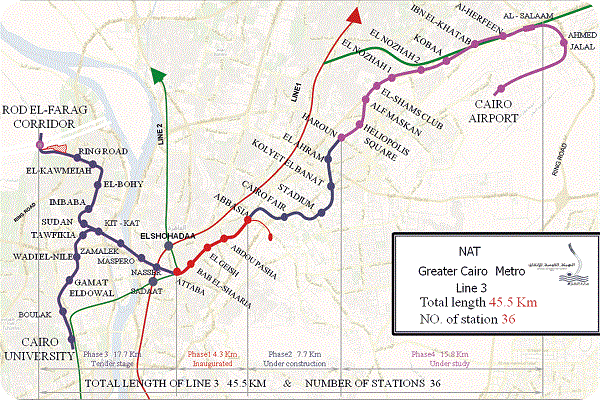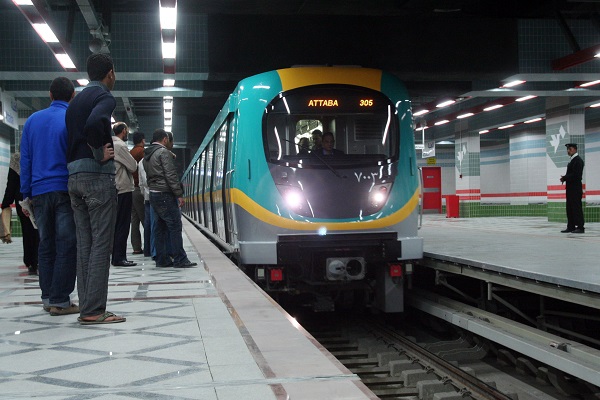by Hassan Baraka: Minister of Transport Eng. Hani Dahi has announced that the State has embarked on a project worth LE70bn to underscore its commitment to ensuring that its public transport system provides a safe and safety and comprehensive service. Three underground Metro projects are simultaneously under construction.
Work on the first part of the fourth phase of the Metro has begun, starting from Haroun Station and running as far as al-Nozha through a 5.10-kilometre tunnel at a cost of LE5.7bn. Dahi says that before the project began in April there had been strenuous negotiations that yielded a promise of one billion Egyptian pounds.
Public utilities are being re-routed in the second part of the fourth phase on a 6.4-kilometre line, as the overground route will be implemented at a cost of LE5.8bn before the end of this month, when the site will be handed over to the consortium of companies who will carry out the project.
Technical and financial evaluation procedures of the third phase of Metro Line 3 (Attaba–Imbaba–Cairo University) were being finalised, Dahi says. The winning company which will carry out the project on the 18-kilometre line at a cost of LE22.8bn will be announced and a contract will be signed in August this year. Fifty per cent of public utilities were relocated in this phase, he said.
Technical studies and documents necessary for offering the first phase of Metro Line 4 (6 October-al–Malek al Saleh–al-Fustat) in July are being carried out in cooperation with the Japanese partner, he says. The project will cover 29 kilometres at a cost estimated at LE22bn.
 The ministry is currently negotiating with the Chinese Anhui Foreign Economic Construction Corporation (AFECC) on the cost of the al-Salaam–New Administrative Capital–10 Ramadan Electric Train, Dahi says, adding that the negotiations will be over within two months, after which a contract will be signed between the National Authority for Tunnels and the Chinese company to begin the project.
The ministry is currently negotiating with the Chinese Anhui Foreign Economic Construction Corporation (AFECC) on the cost of the al-Salaam–New Administrative Capital–10 Ramadan Electric Train, Dahi says, adding that the negotiations will be over within two months, after which a contract will be signed between the National Authority for Tunnels and the Chinese company to begin the project.
“The project is expected to begin before the end of this year, if funding procedures are finalised with China’s Exim Bank which will foot the bill,” Dahi says. He says it will take two years for the project to be completed, starting from the date of signing the contract which will cover the financial and technical offer, the detailed design and the timetable. The Chinese company has completed the technical and financial feasibility studies for the project, and the train route has been defined and sanctioned by the state’s sovereign bodies.
The electric train extends from al-Salaam City to 10 Ramadan City to link the New Administrative Capital with the Suez–Cairo desert road, a length of 170 kilometres and with 14 stations. Dahi says the train will operate from Adly Mansour station in al-Salaam City, and the final station will be linked with the fourth phase of Metro Line 3. This will pass through al-Obour, al-Mostaqbal, al-Shorouk, Badr and al-Robeiki where there will be two branches, one of which will link the New Administrative Capital while the second will run towards 10 Ramadan City and finally Belbeis in Sharqiya. The project will be implemented in conformity with the latest world technology, and the train’s velocity will be designed to reach 120km/hr, Dahi says.
The head of the National Authority for Tunnels, Ismail al-Nagdi, said talks were underway with state and international funding corporations to look at funding for Metro lines 5 and 6. Metro Line 5 (al-Sahel–Nasr City over 24 kilometres) at an estimated cost of LE18bn and Metro Line 6 (Maadi–al-Khosous over 30 kilometres) at a cost estimated at LE20bn.
An integral plan of current Metro lines is currently being worked out to support maintenance work, provide spare parts and renovate train carriages, Dahi says, adding that four new trains are being operated on Line 2 at a cost of LE464mn. Twenty new trains with costs amounting to LE2.3bn are being provided for Line 1, two of which have been received, including one already operating, while the second will be operated during the Lesser Bairam. Fourteen trains operating on Line 1 are being renovated, along with the stations and the monitoring and safety systems.
The authority has commenced procedures for transferring the ownership of the Heliopolis tramway between the authority, the Cairo Governorate and the Public Transport Authority so it can be renovated and upgraded. Dahi says that a state-of-the-art electric train will be inaugurated. The tramway will be reopened to ease the burden on Downtown Cairo and other areas it serves and decrease the pressure on the Metro Line 1 (al-Marg–Helwan).
Cairo Governorate and the Public Transport Authority in Greater Cairo have approved the transfer of ownership of the tramway to the National Authority for Tunnels, particularly the Abdel-Aziz Fahmi line and the workshops in Almaza, along with the Merghani line. The final approval of the Cabinet is awaited for the transfer of these assets, Dahi says, adding that the tramway will be renovated and provided with new trains and new infrastructure.
The Heliopolis tramway project will be linked with the current Metro network and electric line to become a developed future public transport network inside Cairo, Dahi says.
An agreement has been signed with the French partner worth 300 million euros to develop the Alexandria tramway within the framework of a comprehensive plan for developing public transport in Alexandria.
